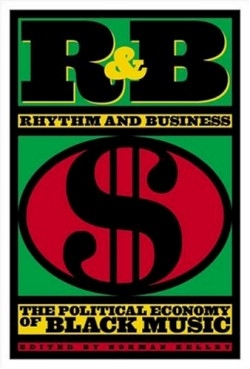R & B (Rhythm and Business)
The Political Economy of Black Music
This collection of twenty essays, articles, panel discussion transcripts, and interviews provides a fairly comprehensive examination of how the American record business has operated since it came into being, and of the sticky situation it now faces in keeping its leverage over musicians and consumers as the world plunges into the digital age.
The editor, who wrote the Nina Halligan political mystery series, builds the collection around his lead essay, “Notes on the Political Economy of Black Music,” contending that the recording and music publishing industry has grown fat and powerful on black talent—which it either underpays or fails to pay altogether. There are a number of elements that enable the music business to get away with such shoddy practices, Kelley and his adherents point out, including copyright laws that are tilted in favor of record companies and publishers, foggy accounting of royalties, the eagerness and naivete of performers who want to record, and the enormous imbalance of economic power.
While the tendency of record companies to cheat their artists has been well documented, Kelley fails to demonstrate that black musicians are more victimized than their white or Latin counterparts. For example, rock star Courtney Love notes in her rallying cry to other recording artists that Merle Haggard did not receive his first check from record royalties until 2000, although he had been recording since the 1960s and had scored twenty-three No. 1 country music hits. Love’s letter, which concludes this book, is a brief but eloquent summary of the serf-like conditions in which she and her peers (even supposedly powerful ones like Haggard) find themselves as they confront decades of institutionalized inequities.
One voice here suggests that record companies aren’t always the villains they’re perceived to be: Danny Goldberg, former head of the Atlantic and Mercury labels, argues persuasively that artists whose albums sell under 50,000 copies “clearly make no money for themselves or their record companies in the major-label game” and that even those who sell as many as 200,000 albums are regarded by their labels as economic disappointments, even though they do yield a small profit. “The biggest obstacle to commercial fulfillment for all but the few genuine stars,” Goldberg concludes, “will not be the music business, but the wants of the people: the cruelest, most fickle, and most generous boss of all.”
Other essays of particular value to actual and would-be recording artists and their managers are Charles C. Mann’s “The Heavenly Juke Box” and William Phillips’s “Music and New Technology: Making Music in the Digital Age.”
Reviewed by
Edward Morris
Disclosure: This article is not an endorsement, but a review. The publisher of this book provided free copies of the book to have their book reviewed by a professional reviewer. No fee was paid by the publisher for this review. Foreword Reviews only recommends books that we love. Foreword Magazine, Inc. is disclosing this in accordance with the Federal Trade Commission’s 16 CFR, Part 255.

